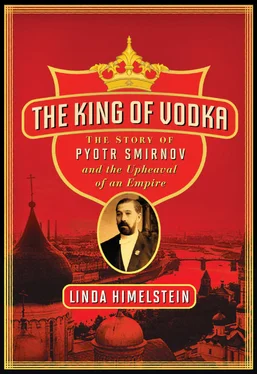The establishment was an instant hit. In less than a year, Grigoriy earned enough money to buy his freedom. It was a momentous occasion for the entire Smirnov family. Grigoriy’s emancipation brought hope that all of its members might one day leave their peasant roots behind to become part of a burgeoning class of merchants.
Opportunity that had long evaded Russia’s lower classes was not as elusive as it had been in previous years. In the nineteenth century, Russia’s tsars allowed for more free enterprise than virtually any generation since Peter the Great. A newfangled brand of capitalism and entrepreneurship blossomed, beginning with the reign of Alexander I, in large part due to the demands of industrialization. The state could not single-handedly manage all that was needed to jumpstart economic development, from building railroads to modernizing arcane industries to establishing banking centers. Necessity, in its purest form, opened the door to dozens of ambitious go-getters—especially those involved in less capital-intensive enterprises. 17Grigoriy, and later Pyotr, were just two of the thousands who seized the moment.
Grigoriy led the way, powering ahead in Uglich. Within five years, he owned three hotels and several wine cellars—and he was also making his own beer. [5] Grigoriy’s business history is culled from pages in the Uglich government archives.
The former village serf was managing a rapidly increasing portfolio. Grigoriy’s new status intoxicated Pyotr especially, though his father and older brother certainly took note. Together, around 1840, they left their village for Uglich to get a closer look at the face of prosperity. [6] A local listing of businesses confirms that Arseniy came to Uglich to work with Grigoriy. It is presumed that Pyotr and his brother did as well since boys typically stayed with their fathers.
THE TRIO ARRIVED full of anticipation. It must have been eye-opening for young Pyotr and Yakov, to see their uncle now mingling with his well-heeled neighbors. He opened his wallet nearly as easily as they did. As the business grew, Grigoriy installed Arseniy as manager of the front desk in one of his hotels. The boys, alongside Grigoriy’s own sons, took on whatever menial tasks came their way—from serving drinks to cleaning up the foul smells left by men too drunk to see their way clear to the outhouse.
Pyotr and Yakov had been around burly, hard-drinking men before. Every village, including the Smirnovs’, had at least one family designated to make moonshine. Usually a couple of miles outside the main residences, a little wooden house was erected for the sole purpose of producing alcohol made from fermented bread. They used a rudimentary system, which often created liquor with pieces of bread still swimming on top. The drink was cheap, plentiful, and popular. For many, it was a breakfast staple, a warming agent to combat frosty dawns before the workday began.
Village moonshine, though, was nothing compared to the drinks at Uncle Grigoriy’s taverns. They were a substantial cut above the boys’ previous, comparatively primitive experiences. But that was not what most fascinated them about their new surroundings. More enticing was the actual running of a business. The boys had never seen such an operation in action before, and Pyotr must have been mesmerized. He soon began approaching his menial job like a boy at school, observing everything, studying everyone. Grigoriy, a beloved uncle and shrewd entrepreneur, became his mentor. Pyotr, a doting nephew, enthusiastically slipped into the role of pupil.
The education of Pyotr Smirnov had begun. The subtle—and not so subtle—lessons he picked up from Grigoriy would later prove essential to Pyotr’s own success. Indeed, many of them served as roadmaps for how Pyotr launched and grew his businesses. He learned how vital it was to be fearless, expeditious, and innovative. Grigoriy, for instance, was a location mastermind. All three of his hotels were situated in central areas with high foot traffic. It was ideal for drawing in the greatest number of walk-in customers and for building name recognition from passersby. He also never hesitated to expand his business, more fearful of complacency than of risk taking; he elbowed out competitors vying for coveted rental spaces and business licenses. Grigoriy was also an innovator. He was the first proprietor in town to seek permission to open up at seven o’clock in the morning. He argued before local officials that “crowds of people,” mostly peasants, began forming as early as five o’clock because, unlike the more well-to-do residents and visitors, they had nowhere to go to escape the bitter cold. 18They could not warm themselves with a cup of tea because only taverns could provide tea for “gray people,” slang for commoners. These travelers had no access to the more upscale watering holes. Grigoriy got his wish, endearing himself to throngs of new paying customers passing through Uglich. Soon, everyone was open early. But again, Grigoriy was there first.
At his uncle’s knee, Pyotr’s business instincts and quiet intelligence were sharpened well beyond his years. But Pyotr’s time in Uglich was coming to an end, although he didn’t know it quite yet. In 1843 Pyotr’s grandfather, still at home in the village, took ill and died. The sad event forced Arseniy, the most unencumbered of the Smirnov men of his generation, to return to his village immediately to help manage the property and console family members. The big question: What to do with the boys? Pyotr, just twelve years old, was maturing quickly, but he still had much to learn from his uncle, something Arseniy may have instinctively understood. He agreed to let Pyotr remain in Uglich—at least for the time being. He could continue to earn money and still be close enough to home if Arseniy needed his help. Yakov, however, was almost seventeen, having grown into a tall, robust young man. The family needed to increase its income to have any hope of gaining its freedom, and Yakov could do better in Moscow than in Uglich, earning twice as much money there, even by washing dishes.
Already a growing number of peasants from the Yaroslavl province, about 9 percent, were leaving for seasonal work. Most went to St. Petersburg, the capital. But increasingly, they were also heading to Moscow, where communities of immigrant serfs were settling in small pockets throughout the growing city. Arseniy’s brother, Ivan, belonged to this group. He had been going to Moscow for seasonal work since the age of ten. 19He would pick up odd jobs here and there, mostly in wine cellars and pubs. Yaroslavl peasants were well represented in Moscow’s liquor industry; indeed, one-third of them found jobs in the shops, cellars, or pubs.
Ivan had been more successful than most. About the same time Grigoriy launched his business in Uglich, Ivan landed a plum job working for Aleksander Yakovlev, a wine merchant in Moscow. As Yakovlev’s right-hand man, he helped manage the former peasant’s wine cellar and retail outlets. [7] The timing of Ivan’s arrival in Moscow is derived from his death notice.
The work was a natural fit for Ivan—and fruitful. When Yakovlev died suddenly in 1839, Ivan took over the business. Within one year, he had earned enough to be the second Smirnov to pay off his ransom and, in 1840, gain his freedom. Within another year, Ivan was firmly established as a merchant of the “third guild,” the lowest rung in the hierarchy of Moscow merchants. But it was a solid step toward independence and respectability.
Thinking about his son, Arseniy made the most practical choice: Yakov must go to Moscow. There, under Ivan’s watchful eye, he might earn enough money to hasten the family’s quest for liberty.
Pyotr may well have envied Yakov. He knew most Muscovites would have looked on him as a country bumpkin. He was uneducated and uncultured, but Pyotr had grown into a determined adolescent while in Uglich. He had tasted freedom and scratched up against success; he had seen one of his own climb from the bottom of the social order to a position of respect. Staying behind in this relative speck of a town, while his brother got to experience the great metropolis, may have seemed unfair. Why should he remain glued to his humble birthplace, close to his parents, while others were migrating, progressing, and succeeding?
Читать дальше












